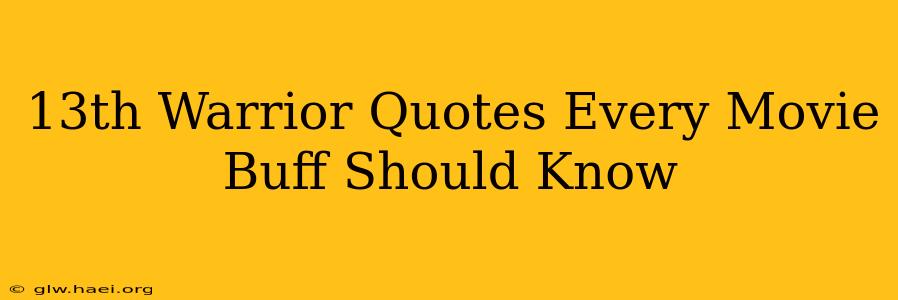The 13th Warrior, a thrilling historical epic based on Michael Crichton's novel Eaters of the Dead, isn't just a sword-and-sandals adventure; it's a poignant tale of cultural clash, courage, and the enduring power of camaraderie. While the film might not be as widely quoted as some other action classics, its memorable lines resonate with viewers long after the credits roll. This isn't just a list; it's a journey back to the misty battlefields of 10th-century Scandinavia, exploring the weight and wisdom behind each unforgettable quote.
"We are the 13th Warrior."
This powerful declaration, uttered by Ahmed ibn Fadlan (Antonio Banderas) as he joins the band of Norse warriors, encapsulates the entire film's central theme. It’s more than just a statement of numbers; it's a declaration of belonging, a testament to the unlikely alliance forged amidst a bloody and unforgiving landscape. It symbolizes the breaking down of cultural barriers and the acceptance of a shared destiny in the face of overwhelming odds. The weight of this simple sentence rests on the transformation Ibn Fadlan undergoes, swapping the comforts of his scholarly life for the brutal realities of war alongside people vastly different from himself.
"A man's worth is judged by his deeds, not his words."
This stark, yet compelling line highlights the pragmatic nature of the Viking warriors. They value action over flowery rhetoric, emphasizing the importance of proven strength and loyalty over empty promises. It reflects the unforgiving environment they inhabit, where survival depends on unwavering courage and immediate action. In a world where betrayal is a constant threat, their faith rests in concrete actions, not eloquent pronouncements.
"What is a man without his clan?"
This quote speaks volumes about the deeply ingrained sense of community and loyalty amongst the Vikings. Family and clan are the bedrock of their society, providing structure, support, and a sense of belonging that transcends individual ambitions. It's a poignant reflection on the importance of connection and the devastation of isolation, themes that are particularly resonant given Ibn Fadlan's journey from a foreign land.
"Death is certain, but the timing is uncertain. "
This quote encapsulates the warrior's acceptance of mortality. While not a uniquely Viking philosophy, the context underscores the pervasive understanding that death is an ever-present possibility within their violent world. Instead of fearing it, they embrace it as an inevitable part of life, focusing on living each moment to its fullest extent. It’s a stoic reminder to appreciate the life we have while it lasts.
Frequently Asked Questions (PAA)
Q: What is the main theme of the movie "The 13th Warrior"?
A: The main theme explores the intersection of two vastly different cultures—the sophisticated Arab scholar Ibn Fadlan and the fierce Norse warriors—forced to unite against a common enemy. It highlights themes of courage, loyalty, cultural understanding, and the acceptance of differences in the face of adversity. The film also touches upon the brutality of war and the universal human experience of fear, loss, and sacrifice.
Q: Is "The 13th Warrior" based on a true story?
A: While inspired by historical elements, "The 13th Warrior" is based on Michael Crichton's novel Eaters of the Dead, which itself draws inspiration from historical accounts and legends. The story is largely fictionalized, although it uses the backdrop of the Viking Age and incorporates elements of Norse culture and mythology.
Q: What are the key differences between the book and the movie?
A: The film and the novel differ in several aspects. The movie streamlines the plot, changes certain character details, and alters some key events for cinematic effect. While the core themes of cultural clash and battling a mysterious enemy remain consistent, the movie prioritizes action and visual storytelling, whereas the novel delves deeper into character development and the complexities of the historical and mythological backdrop.
Q: Who are the main characters in "The 13th Warrior"?
A: The two principal characters are Ahmed ibn Fadlan, a scholarly envoy from Baghdad, and Buliwyf, the leader of the Norse warrior band. Other significant characters include the various members of Buliwyf's clan, each with their own unique personalities and fighting styles.
Q: Why is the movie called "The 13th Warrior"?
A: The title directly relates to Ibn Fadlan's inclusion in the group of twelve Norse warriors. He becomes the thirteenth warrior, completing their fighting force and significantly altering their dynamics. It represents the outsider's integration into a foreign culture and his unforeseen contribution to their shared struggle for survival.
The 13th Warrior offers more than just thrilling fight sequences; it's a contemplation of human nature, courage, and the power of unity in the face of adversity. These quotes, steeped in the film's raw emotion and powerful imagery, continue to resonate with viewers, reminding us of the enduring strength of the human spirit.

